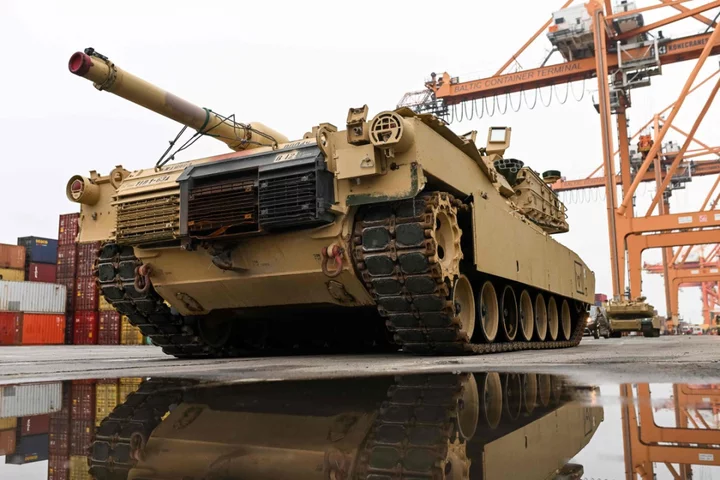
What are Abrams tanks and why is the US sending them to Ukraine?
The US has pledged to send 31 of its M1 Abram battle tanks, worth an estimated $400m, to Ukraine to help the resistance fight back against the Russian onslaught as the one-year anniversary of Vladimir Putin’s invasion approaches. Anatoly Antonov, Russia’s ambassador to the US, said the decision by Joe Biden’s administration amounted to “another blatant provocation” against Moscow, pledged that the tanks would be destroyed and warned the West it would come to regret the “delusion” that Ukraine could ever win the day. Russian state TV has since made a point of mocking the Abrams as “battered” and prone to getting stuck in a segment downplaying the threat the new additions to Kyiv’s arsenal pose. Ukraine’s president Volodymyr Zelensky has said he believes tanks are crucial to replenish his nation’s military hardware ahead of what he says will be increased Russian offences in the spring, with intense fighting already seen in eastern Ukraine for weeks. Kyiv also wants them to boost its bid to recapture territory taken by Moscow’s forces earlier in the conflict. Germany has dithered on the question of whether to answer Mr Zelensky’s appeal for tanks but has since agreed to send Leopard 2 models, with Poland, Canada, Norway and Spain now looking set to follow suit. When it comes to the M1s, experts have warned of the complex logistics involved in getting these high-tech vehicles to the battlefield. The extensive and tricky maintenance required for their use mean that it could be some time before they appear on the frontlines in Eastern Europe. The first M1 tank was manufactured by American armoured vehicle manufacturer General Dynamics Land Systems in 1978 and was first delivered to the US Army in 1980. Each model costs around $10m to make, according to Reuters. It has to be crewed by a team of four (driver, commander, loader and gunner), has a maximum speed of 42 miles per hour, has a maximum range of 624 miles and runs on a 1,500 horsepower gas turbine engine. The M1 is armed with an M256 120mm smoothbore cannon, as well as two machine guns: a 12.7mm and a 7.62mm M240. Defence industry expert Sydney Freedberg described them as “big vehicles, heavily armoured” to Al Jazeera, adding that they are “much better protected than anything the Soviets built, or anything the Russians currently have.” He also cautioned that they have been used far less often in Europe than the Leopard and could end up posing the Ukrainians problems, given that they require additional training and will need spare parts, warehousing and a high degree of care. “It guzzles fuel and the engine is difficult to repair and maintain,” Jack Watling, a senior research fellow for land warfare at the Royal United Services Institute, has also warned. More positive about their potential impact – while still favouring the Leopards over all – was retired US army general Mark Hertling, who commanded the 1st Armored Division in Iraq during the troop surge of 2007 to 2008, and who said in a Twitter thread: “The M1-series, in my view, is the best in the world.” He too stressed that training was “critical”, adding: “Having fired T-72s, Chieftains, Challengers, Leo IIs & Abrams, the M1 requires the most turret training.” Read More Ukraine-Russia news – live: Putin ‘shifting war to focus on Nato and West’ Russian shells kill 10 in Ukraine as Putin’s forces seek gains before Western tanks arrive Who is sending tanks to Ukraine?
2023-09-22 14:55
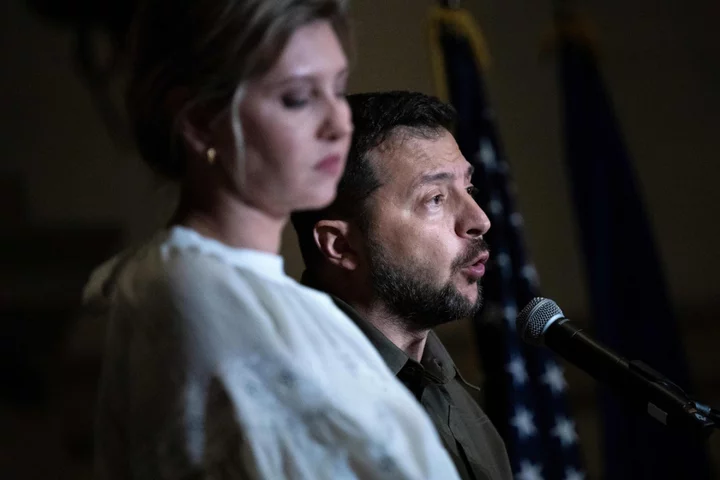
Zelensky makes passionate plea to US lawmakers on key Washington visit
Volodymyr Zelensky made a passionate plea to American lawmakers at Capitol Hill as his second trip to Washington – since the Ukraine invasion – came to an end. The Ukrainian president got a $325m aid package from the Biden administration as he wrapped up his second visit, said to be more muted compared to the hype that surrounded his earlier one. However, senate majority leader Chuck Schumer on Thursday summed up an impassioned plea made by the wartime president to American lawmakers even as Republicans debate flow of financial aid to Ukraine for more than 20 months now. “There was a single sentence that summed it all up, and I’m quoting him verbatim. Mr Zelensky said: ‘If we don’t get the aid we will lose the war’,” Mr Schumer told reporters. The president also held private talks with both Republican and Democratic leaders to relay Kyiv’s message for further aid and help push Russia from its territory as the war appears to enter another looming winter. President Joe Biden said he is “counting on the good judgment of the United States Congress” in the absence of an alternative to aid Ukraine against the biggest military warfare ever since the Second World War. US lawmakers quoted Mr Zelensky as saying that the Ukrainians have a solid war plan and “they are winning”. Independent senators, however, noted Mr Zelensky “conceded that it’s tough, very tough to overcome entrenched defences”. “They believe they will make slow but steady progress, but it’s not going to be quick,” said independent senator Angus King. After wrapping up his second day in the US, Mr Zelensky called it an important trip to Washington DC. “There is a new defence package: air defence, artillery, shells, engineering equipment. There is also a long-term agreement – we will work together for Ukraine to produce the necessary weapons together with the United States,” he said. “My day began on Capitol Hill with candid and extensive discussions. Both chambers and parties. I sensed trust, which fosters unity. “Members of Congress asked direct questions and received candid responses. Transparency is our top priority in our relations with the US. I also had important defence talks at the Pentagon,” he said. The Ukrainian president received a red-carpet welcome on the White House South lawn and attended more ceremonies than offered to other world leaders on visits to the administration. In a setback, the Biden administration’s request to Congress for an additional $24bn for Ukraine’s military and humanitarian needs is hanging in the balance. Resistance to the latest request could lead to delays or reductions. The latest package, secretary of state Antony Blinken said, would include additional air defence, artillery ammunition, cluster munitions and other arms. House speaker Kevin McCarthy said he declined Mr Zelensky’s request for a joint session of Congress, as had happened during the Ukrainian president’s visit to Washington last winter, saying there wasn’t time for it on short notice. But the Republican leader praised answers the Ukrainian delegation offered to lawmakers. “It was direct, I thought it was honest, they were answering the questions,” Mr McCarthy said. “I heard a lot of positive things.” Lawmakers who attended the private meeting described questioning Mr Zelensky on the way forward for Ukraine’s counteroffensive, as the fight to roll back invading Russian forces moves closer to the two-year mark without major breakthroughs. With Mr Zelensky’s visit, White House national security adviser Jake Sullivan said the Biden administration is looking to underline the message that the US and the world “send the unmistakable message that in the 21st century, a dictator cannot be allowed to conquer or carve up his neighbour’s territory”. “If we allow that here. it will happen elsewhere in ways that will undermine fundamental security, not to mention the values that the American people hold so dear,” Mr Sullivan said. Mr Zelensky departed for Canada after wrapping up his meetings in Washington on Thursday and was greeted by Canadian prime minister Justin Trudeau on arrival. He is expected to address the Canadian parliament on Friday. Read More Why has Poland stopped supplying weapons to Ukraine? Ukraine-Russia war - live: Biden’s $325m package for Zelensky as Pentagon says Abram tanks ‘on schedule’ Zelenskyy to speak before Canadian Parliament in his campaign to shore up support for Ukraine Watch as Zelensky meets with Biden for talks at White House President Zelensky and Ukraine’s First Lady arrive at White House
2023-09-22 14:48
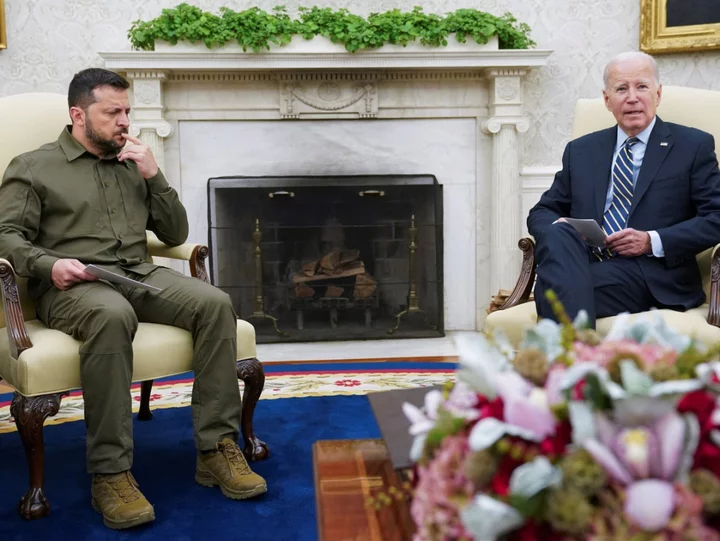
Ukraine-Russia war - live: Biden’s $325m package for Zelensky as Pentagon says Abram tanks ‘on schedule’
Joe Biden has announced a new $325m military aid package for Ukraine that will include air defence systems and other weaponry to help Kyiv face a tough winter, White House national security adviser Jake Sullivan said. The announcement came as he met Volodymyr Zelensky at the White House after the Ukrainian leader had what he said were “frank” conversations with members of Congress over future support. This comes as the Pentagon announced “everything is on schedule” after being asked about the timing of the top-tier Abram tanks in the war zone for Ukraine. “For security reasons, I’m not going to be able to go into specifics in terms of when the tanks will arrive, other than to say that we expect them to arrive in Ukraine in the coming days and weeks,” Pentagon spokesperson brigadier general Patrick Ryder said in his briefing with reporters. Earlier, experts said Russian military chiefs had ordered troops to carry out “ill-conceived and unsupported” counterattacks in Bakhmut to urgently regain lost ground. One military blogger reportedly observed that “hysterical” counterattacks were depleting Russian resources and reserves. Read More Biden pledges more support for Ukraine’s defence as he announces new arms package President Zelensky and Ukraine’s First Lady arrive at White House Zelensky says he had ‘very strong dialogue with senators’ after closed-door meeting over Ukraine aid
2023-09-22 12:27
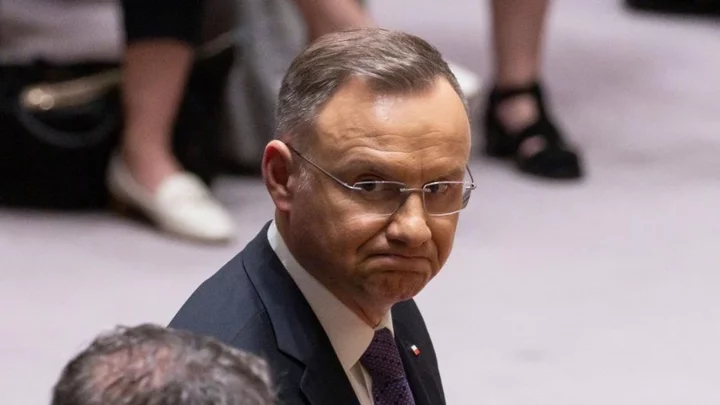
A shadow of 'Ukraine fatigue' hangs over Polish politics
With an election looming, politicians are grappling with how to support Ukraine and prioritise national interests.
2023-09-22 05:57
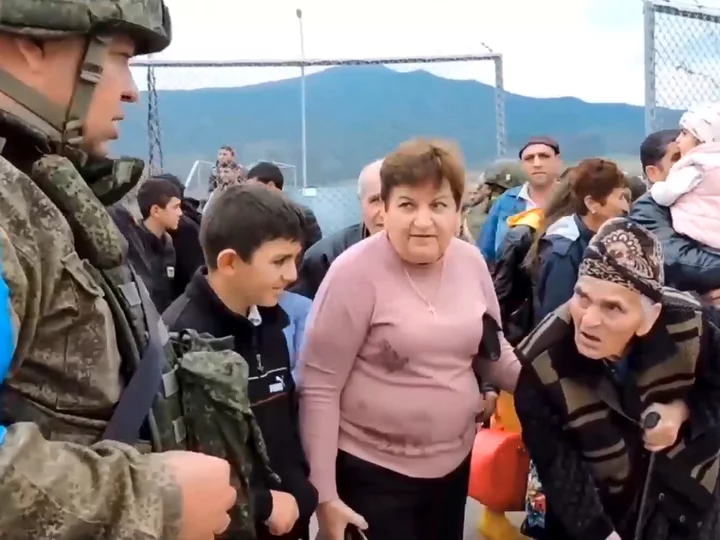
‘Food is running out’: Warning of humanitarian crisis in Nagorno-Karabakh as no deal reached in talks
Talks between a breakaway Armenian republic and Azerbaijan over the future of the wartorn region of Nagorno-Karabakh closed on Thursday without a final agreement, amid accusations Baku’s forces violated a ceasefire. A tense truce has been in place since Azerbaijan’s army claimed full control over the area after launching a lightning offensive against local Armenian forces on Tuesday. Residents of the Karabakh’s main city told The Independent that shelling and gunfire rang through the suburbs on Thursday morning. They added that a “humanitarian catastrophe” was unfolding as electricity had been completely cut off, food was running out and thousands of displaced civilians were hiding in shelters. Azerbaijani officials on Thursday agreed to provide humanitarian aid, including energy to heat kindergartens and schools, a statement from Azerbaijan president Ilham Aliyev’s office said. Meanwhile Mr Aliyev declared victory in a televised address to the nation, saying his country had restored its sovereignty over Nagorno-Karabakh. The Independent was unable to verify who was behind the attacks, which came amid talks to hammer out an agreement ahead of a United Nations Security Council meeting on the violence. Karabakh’s Armenian authorities blamed the assault on Azerbaijani forces. Baku’s defence ministry called the allegations it had broken the truce “completely false”. Thursday’s meeting held in the Azerbaijani town of Yevlakh ended in no firm deal. David Babayan, an adviser to Nagorno-Karabah’s ethnic Armenian leader Samvel Shahramanyan, told Reuters that while there was an agreement over the cessation of military action “we await a final agreement, talks are going on”. He said that there were not enough security guarantees in place to mean that local Armenian forces would give up their weapons. “A whole host of questions still need to be resolved,” he said. Both sides have been locked in a bloody battle over the mountainous Nagorno-Karabakh region, also known as Artsakh by Armenians, since the 1990s following the collapse of the Soviet Union. It is internationally recognised as part of Azerbaijan – which is backed by Turkey – but home to 120,000 ethnic Armenians who have enjoyed de facto independence. In 2020, a six-week war erupted which left 6,700 people dead and saw Azerbaijan reclaim about a third of the region. Russia, historically a close ally of Armenia that has long seen itself as a security guarantee in the South Caucuses, brokered a truce and dispatched 2,000 peacekeepers. That was broken on Tuesday by the Azerbaijan army that unleashed a fresh wave of artillery and drone strikes against the outnumbered and undersupplied pro-Armenian forces, raising concerns that a full-scale war could resume. The fighting worsened an already burgeoning humanitarian crisis for residents who have endured nine months of food, electricity and medicine shortages. This is due to Azerbaijan’s blockade of the “Lachin Corridor”, the road connecting Nagorno-Karabakh to Armenia. Nagorno-Karabakh human rights ombudsman Gegham Stepanyan said at least 200 people, including 10 civilians, were killed. The figures could not immediately be independently verified. Facing mounting pressure, local Armenian self-defence forces agreed on Wednesday to disarm and disband. The UN Security Council scheduled an urgent meeting on Thursday on the Azerbaijani offensive at the request of France. French president Emmanuel Macron condemned Azerbaijan’s decision to use force “at the risk of worsening the humanitarian crisis in Nagorno-Karabakh”. US secretary of state Antony Blinken denounced Baku’s use of military force saying that these actions “undermine prospects for peace: and were ‘unacceptable’”. Residents of the main city Stepanakert, which Azerbaijan calls Khankendi, said thousands of civilians had fled rural areas to the city centre and were now living in shelters without electricity and scant food supplies. “It’s unimaginably hard here. People can’t find food, we have over 10,000 people evacuated from villages, there are children, the elderly and missing people,” said Siranush Sargsyan, a freelance Armenian journalist in the city. “This morning we heard shooting and shelling, panicking the neighbourhood. People started to run,” she continued, adding that the biggest concern now was “staying alive and finding missing relatives”. She said network connection had been bad because of the lack of electricity meaning that many people were unaccounted for. “For the last three days, we haven’t had any electricity at all.” Gev Iskajyan, executive director of ANC, an Armenian lobbying group in the US, went as far as to say Thursday was “the final stage of Artsakh’s ethnic cleansing”. Also speaking from Stepanakert he said he feared a “mass exodus of people” from their homes. “We need to create mechanisms that would ensure the safe movement of the ethnic Armenians from Artsakh to Armenia,” he added. It’s unimaginably hard here. People can’t find food, we have over 10000 evacuees Siranush Sargsyan, journalist in Nagorno-Karabakh Sheila Paylan, an international human rights lawyer and former adviser to the UN, said the situation “couldn’t be more dangerous for the Armenians”. “The international obligation to intervene is [needed] now more than ever. There should be a possibility of international sanctions against Azerbaijan to change this condemnable behaviour,” she added. Restoring control over the war-ravaged region has been a key goal for Mr Aliyev, who on Wednesday said Azerbaijan had triumphed with an “iron fist”. “After the surrender of the criminal junta, this source of tension, this den of poison, has already been consigned to history,” Mr Aliyev said, focusing his anger on Karabakh’s leadership. He said the region’s ethnic Armenians would enjoy full educational, cultural and religious rights. All ethnic groups and faiths would be united as “one fist – for Azerbaijan, for dignity, for the motherland”. It has been a damning blow to the separatist Karabakh leadership and for Armenia, which helped Armenians in the enclave and fought two wars with Azerbaijan in the space of 30 years. Armenia’s foreign ministry condemned Azerbaijan’s military operation saying it was part of a “policy of ethnic cleansing”. Armenian prime minister Nikol Pashinyan later said that Armenians were going through “untold physical and psychological suffering”. Baku has faced mounting criticism from the international community for turning to force. Mr Macron, who spoke to Mr Aliyev on Wednesday, said the fighting compromised ongoing efforts to achieve “fair and lasting peace”. He stressed the need to respect the ceasefire and provide guarantees for “the rights and security of the people of Karabakh, in line with international law”. Protesters rallied in the Armenian capital of Yerevan for a third day on Thursday, demanding that authorities defend Armenians in Nagorno-Karabakh. The Russian foreign ministry has called for an “immediate halt to the bloodshed”. Read More Stones thrown as Armenian protesters clash with police after ceasefire Talks have opened on the future of Nagorno-Karabakh as Azerbaijan claims full control of the region Azerbaijan hails end of Armenian separatists’ advance in Nagorno-Karabakh Talks have opened on the future of Nagorno-Karabakh as Azerbaijan claims full control of the region Putin says Russia peacekeepers ‘doing everything’ to protect civilians as Azerbaijan claims full control of Nagorno-Karabakh Stones thrown as Armenian protesters clash with police after ceasefire Azerbaijan hails end of Armenian separatists’ advance in Nagorno-Karabakh UNGA Briefing: Permanent observers, more Security Council and what else is going on at the UN
2023-09-22 01:47
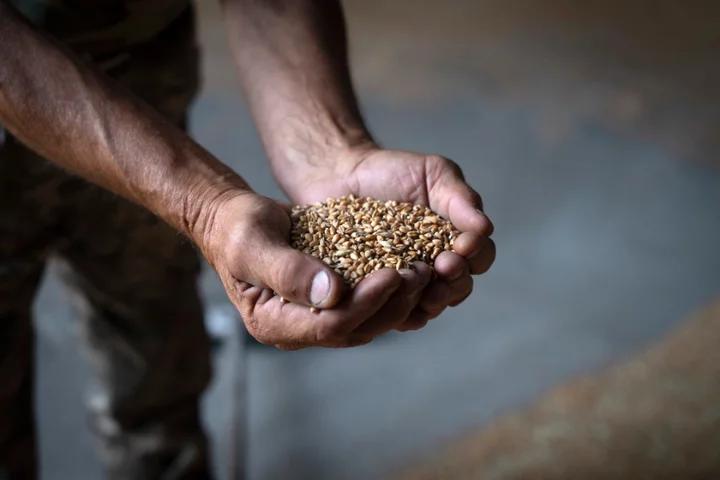
Poland stops sending arms to Ukraine as row over grain imports escalates
Poland said it will stop exporting weapons to Ukraine as a week of escalating tensions between the two countries reached boiling point over a ban on grain imports. Prime minister Mateusz Morawiecki said he would instead be investing the money in arming Poland, which has been one of Ukraine’s staunchest allies since Russia invaded last year, with the most “modern weapons”. The row between the neighbouring countries began last week when Poland imposed an import ban on Ukrainian grain, including wheat and maize, after an EU-brokered deal expired. The deal, which ended on 15 September, allowed Poland, Bulgaria, Romania, Hungary and Slovakia to ban the sale of Ukrainian grain, which they claim has flooded the European market and undercut domestic grain prices since Putin’s invasion, damaging their economies. But Ukraine launched a legal challenge at the World Trade Organisation (WTO) on Monday after Poland reinstated the ban, claiming the country had failed to meet its “international obligations”. Days after, Mr Zelensky told the United Nations General Assembly that “some friends in Europe” were feigning solidarity by indirectly supporting Russia by banning the sale of its grain. Poland then summoned the Ukrainian ambassador to its foreign ministry to protest against Mr Zelensky’s comments. Hours later, Warsaw announced it would no longer be supplying weapons to Ukraine. “We are no longer transferring weapons to Ukraine, because we are now arming Poland with more modern weapons,” the prime minister said. While the country claimed Ukrainian authorities “do not understand” the extent to which Poland’s farming industry has been “destabilised”, one expert claimed Poland was “losing its nerve”. “Poland is losing its nerve. It seems people are starting to get tired of the war, because there has been no breakthrough, there are corruption scandals, and Ukrainian grain imports are damaging the economy,” Dr Marina Miron, post doctoral researcher at King’s College London war studies department, told The Independent. She explained Poland’s upcoming general election on 15 October was crucial in explaining the ban. In recent weeks, Poland’s Law and Justice party has stepped up its rhetoric supporting farmers in recent weeks. “Poland is in its pre-election stage and needs to ensure domestic support,” Dr Miron added. However, Poland’s state assets minister Jacek Sasin claimed the row over grain imports did not mean Poland head ceased to back Ukraine against Russia. “At the moment it is as the prime minister said, in the future we will see. In this case, Polish interests come first,” he said. “We cannot disarm the Polish army, we cannot get rid of the weapons that are necessary for our security.” “Where we could arrange for the transfer of weapons, we did it and we were very generous in this matter. Here we have absolutely nothing to reproach ourselves with.” Poland has previously sent 320 Soviet-era tanks and 14 MiG-29 fighter jets to the war-torn country. Mr Morawiecki also issued a warning to Kyiv, saying that if they “escalate the conflict”, additional products will be added to the list of banned imports. He said: “I am warning Ukraine’s authorities. Because if they are to escalate the conflict like that, we will add additional products to the ban on imports into Poland.” Poland’s decision has been criticised around the world. Donald Tusk, a top EU opposition leader, accused Morawiecki and other ruling authorities of a “moral and geopolitical scandal of stabbing Ukraine in the back politically when they decide to fight on the Ukrainian front, just because it will be profitable for their campaign.” Michal Baranowski, security and defence expert, added: “The message is very bad, both for Poland’s reputation but also because Poland has been one of the chief advocates of military aid to Ukraine. Saying Poland will not be sending more weapons means that Poland can no longer play this role.” Read More Why has Poland stopped supplying weapons to Ukraine? Ukraine-Russia war - live: Major blow for Kyiv as Poland cuts off weapons and issues warning to Zelensky Zelensky accuses ‘some friends in Europe’ of playing into Russia’s hands
2023-09-21 23:17
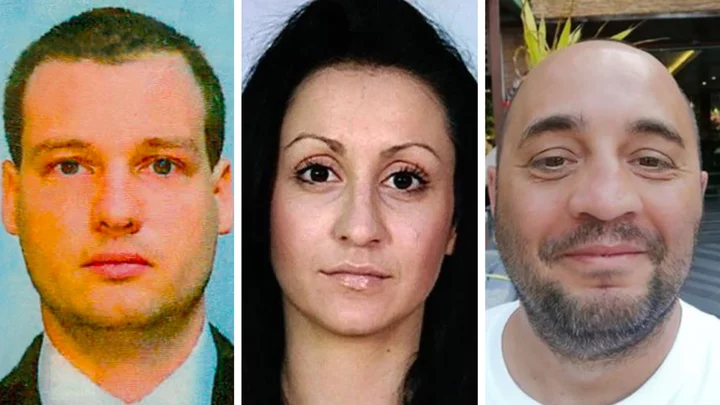
Five to be charged in UK with spying for Russia
Three men and two women are to be charged with conspiracy to conduct espionage, UK prosecutors say.
2023-09-21 21:24
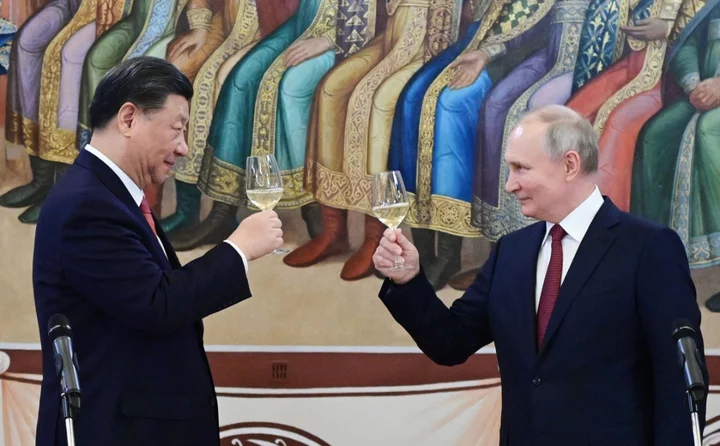
Putin trip to meet Xi in China confirmed for next month
Vladimir Putin has accepted an invite from Xi Jinping to visit China for a Belt and Road Summit being held in October in his first known trip abroad since an arrest warrant was slapped against him for the deportation of children from Ukraine. The Russian president recently met North Korean dictator Kim Jong-un and is looking to cement ties with a handful of allies after being isolated on the world stage due to his invasion of Ukraine. Russia and China are “integrating our ideas of creating a large Eurasian space”, Mr Putin said, adding that the Chinese-led Belt and Road initiative is a part of that. He announced his intention to visit Beijing after a meeting with Chinese foreign minister Wang Yi, who is in Moscow this week for a strategic diplomatic visit. Mr Putin told the top Chinese diplomat that the Belt and Road strategy “fully meets and coincides” with Russia’s interests, according to a statement by the Kremlin. He will be attending the summit in Chinese capital Beijing. “We believe in merging our vision of creating a Greater Eurasian space with the idea of our Chinese friends as part of the Belt and Road Initiative, and we have been quite good at synchronising our efforts,” he said. After invading Ukraine in February last year, Mr Putin has increasingly relied on seeking support from his allies in Asia, prominently China and North Korea. Russia has also amped up trade with China by selling it more energy and showing diplomatic bonhomie by carrying out joint military exercises. The talks in Beijing will be thorough, said Nikolai Patrushev, a close aide to the Russian president and the secretary of Russia’s Security Council. He said Russia and China should deepen cooperation in the face of the West’s attempt to contain them both. Both countries also have strained relations with the US, with Mr Xi briefly becoming the only foreign leader to have paid Mr Putin a visit in Moscow until recently, when Mr Kim revelled in his own six-day sojourn to Russia’s far east. A flagship initiative of Beijing, the Belt and Road project has been a key prospect for China to expand its influence in developing countries through infrastructure projects. On the continuing war in Ukraine, China has shown a neutral stand and has gone to the extent of criticising Western sanctions against Moscow and the arming of Kyiv by several Western nations. It also accused Nato and the US of provoking Russia’s military action and declared last year that it had a “no-limits” friendship with Russia. Earlier this year, CIA director William Burns said Russia was becoming more and more dependent on China and was even at risk of becoming its “economic colony” in time. Read More Why Vladimir Putin needs Xi Jinping now more than ever Why Vladimir Putin and Kim Jong-un are desperate for each other’s help Ukraine kills 130 Russian soldiers in single day in southern push Chinese foreign minister visits Russia for ‘security’ talks day after Kim Jong-un leaves country
2023-09-21 19:28

Analysis-Consumer goods firms' pricing woes may spread beyond France
By Richa Naidu and Helen Reid Consumer goods firms like Nestle, Lindt and Unilever may face increased pressure
2023-09-21 18:56
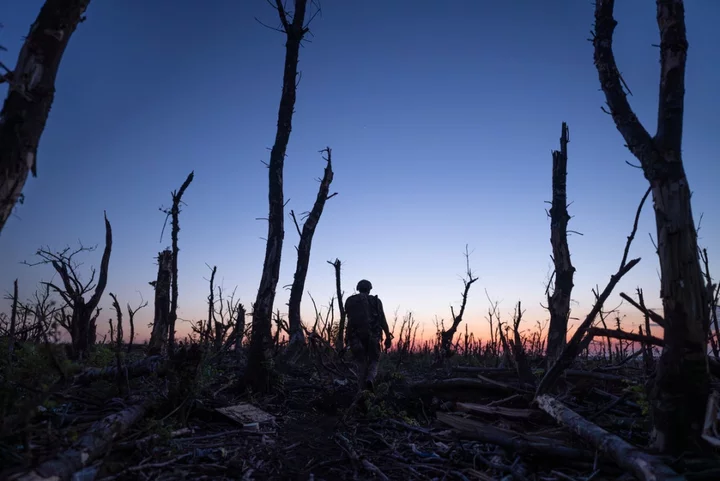
Inside Ukrainian brigade’s battle ‘through hell’ to reclaim village from Putin’s troops on way to Bakhmut
The Russian bullet struck the sergeant just above the left ear. The leader of the Ukrainian platoon was down. Headquarters radioed a battlefield promotion to the private who had called him “brother” — a man known as Courier. Courier knew the platoon's orders were to move forward through the forest, on the road to Bakhmut. He hesitated for 30 seconds near his mortally wounded commander. Maybe a minute. Then he decided: there would be no turning back as he howled “forward”. He fired toward a trench just ahead until he was sure the Russians inside would never shoot again. Then the men stumbled through the charred spindles of trees toward the village of Andriivka — the objective of the 3rd Assault Brigade since the start of Ukraine’s counteroffensive this summer, about 6 miles (10 kilometers) south of the city of Bakhmut. The sergeant, Gagarin, and other injured soldiers could only be evacuated after dark, because the Russians were also hunting downed Ukrainians. Days later, as he prepared for Gagarin's funeral, Courier predicted his own future, his pale eyes unfocused. “This forest is taking our friends away, and this is the worst,” he said. “And when I think about how far we still need to move forward ... most likely someday I will be the one to remain lying in the forest, and my friends will just go forward.” This stretch of dead forest — a couple dozen trees wide and a mile (2 kilometers) long — toward the equally dead village of Andriivka is one of countless like it on the road to Russian-controlled Bakhmut, which has now taken on huge symbolic significance in the Ukrainian counteroffensive. The Associated Press spent two weeks with the brigade for an intimate glimpse into the speed, direction and cost of the counteroffensive, through scenes witnessed in the forest and at rest, in helmet camera footage and drone video. A lot rides on their progress. Ukrainian president Volodymyr Zelensky is making his country's case to Washington on Thursday for more money and weapons, and must persuade his audience that the counteroffensive is working. The US Congress is currently weighing president Joe Biden’s request to provide as much as $24bn more in military and humanitarian aid. In an interview with “60 Minutes,” Mr Zelensky acknowledged the counteroffensive was slow, but added: “It is important that we are moving forward every day and liberating territory.” A study earlier this month by the Royal United Service Institute, a London-based think-tank, found that Ukrainian forces are averaging 700-1,200 meters of progress every five days. That gives Russian forces time to dig in and especially to mine territory as they pull back. The 3rd Assault Brigade, composed entirely of volunteers and considered one of Ukraine’s best and most experienced corps, has been fighting almost nonstop in the east since January, while less-experienced units received new training and modern weapons to fight in the south. The AP is identifying the men by their call-signs, which is both how they identify each other and a military requirement to report in-depth on the unit. Bakhmut fell to Russia in May, largely due to waves of attacks from mercenary Wagner fighters, including prison conscripts thought to have died by the hundreds. Ukraine has been trying to reclaim it ever since, hoping to deal a major psychological blow to Russia. But the soldiers sent to carry out the task are relying on largely Soviet-era armoured vehicles and older weapons. In the past month, the 3rd Assault Brigade had only been able to move a mile (2 kilometers), crossing mines and booby-trapped trenches and dodging artillery, drone-launched grenades and Russian forces within shouting distance. The questions now facing them were the same ones facing their country: Would they succeed, and at what cost? Andriivka was their goal, as important as any strip of land in Ukraine. And on 6 September, the day Courier left his commander's body behind, he and his men took over a trash-strewn trench in the middle of the forest and held it for four full days. On either side of them were mined fields that once grew wheat and now sprout only craters. During moments of rest, he leafed through a diary, written longhand by a Russian soldier: “I’ve been at war for four weeks already and I miss my mum,” Courier read. Courier asked one of the Russian prisoners who surrendered what he knew about the diary. The Russian replied: “I don’t know. I just got here today.” Maybe the author was the Russian whose body Courier propped up to protect himself from incoming fire. Or maybe he was one of the Russians who had shot Gagarin and been killed in turn a few minutes later. Courier didn't know. But by then, Gagarin was dead. And the forest kept claiming others. Shepherd, who was wounded in the leg in the morning and had to wait hours for evacuation from the battlefield, was a mask of pain. Chapa too. A grenade struck Spaniard’s helmet, and the resulting head injury would leave him helpless. Gary had no obvious injuries but was so shell-shocked he could barely make it through a conversation. Courier would go to western Ukraine and represent the platoon at Gagarin’s funeral. Gagarin, ironically named for the Russian cosmonaut who was the first human in space, was buried in his hometown of Polonne, a 550-mile (900-kilometer) drive from the battlefield. As military pallbearers walked uphill toward the churchyard, residents along the way stopped and knelt to honour the dead along flower-lined roads. One of the men carrying the casket remarked on the view from the village cemetery. “I’ve done this 56 times,” he said grimly. Social media feeds from the brigade show dozens of funeral announcements since the counteroffensive began. Gagarin’s mother sought out Courier, who was among the last to see her son alive. But he finds it hard to talk to civilians these days. “I feel like there is a gap between civilians and us now," he said. “When the war is over, I will probably just leave to fight elsewhere.” For Courier, war is complicated. He says he enjoys the dopamine rush, when he leaves the “horrible grinder," comes back to headquarters and jumps down from the armored vehicle. “You look at the sky and you look around, and you understand that you’re alive and nothing can kill you,” he said. "This is the moment. This is a feeling you cannot get anywhere else in life.” And yet he did not want to return to the strip of forest leading to Andriivka. His commanders ordered him to take 10 days’ leave, a break for a fighter whose anguish they sensed despite his outward calm. He would take the time to go fishing and clear his head. “Unfortunately, I’m only able to leave after going through hell,” he said bitterly. On the day of the funeral, 13 September, any man whole enough to fight was in the forest, including another sergeant in the platoon, Fedya. On 5 September, Fedya had been lightly wounded by a cluster munition, and the injury may have saved his life. Gagarin took his place in the assault, and that was the day he died. The last push started on 14 September. Men from other depleted units from the 3rd Assault Brigade joined in for the usual three- to four-day stint on the battlefield. After two months of inching their way forward through the stand of ash trees, maybe they would finally break through the woods to Andriivka. “How many more lives do we need to give?" Fedya asked. "How many more forests are there?” Fedya sees war as something to be perfected through a combination of study and experience. A 24-year-old with a smooth and unlined face, he wears his authority lightly, introspective but with little time or energy to spare on self-doubt or guilt. He dreams of war, and when he wakes, it is there waiting for him to move forward. “War is a science, and you have to get better at it and study. If you don’t, you have no chance of survival,” said Fedya. “The smarter you are, the more qualified you are, the better your chances of coming back alive.” On 14 September, they finally did it — more than three months after receiving the order to reclaim Andriivka. They broke through the shelling and the drone-launched grenades, firing at Russian forces who fled in front of them. The day was a blur. The Ukrainians pummeled the tiny village with artillery and then threw a smokescreen into its main street. Russian artillery hit retreating and surrendering Russian soldiers, whose bodies lay face down or curled on their sides. The last hundred meters was a mix of blood, metal, trash, spent cartridges and shredded armour. The Ukrainians went house to house, taking Russian prisoners and killing those who fought back. Even after the last of the Russian forces were expelled, Andriivka came under constant shelling, with buzzing drones on both sides. Fedya warned his men to shoot down the ones that hovered: They were the ones that dropped grenades. That night, Fedya dreamed he was cowering behind a shrapnel-pierced truck on the battlefield and was hit by artillery fire. The next morning, Fedya carried a Ukrainian flag to hoist in the reclaimed village of Andriivka. It was time to retrieve the bodies. There was the body of 19-year-old Riley, killed on the first day he ever fought. There was Zima. There were others, placed carefully into bags and carried back through the forest. The men left dozens of Russian bodies for later. Andriivka was now nothing but a pile of bricks and scorched trees with the smell of death. But it was in Ukrainian hands, and Fedya was ready to hand control to the next brigade to reclaim the next forest. He huddled in one of the few basements left and tried to explain to the incoming commander why the fight for this broken town was worth it. “Look at these fields, this forest. Everything grows again," he said. "The cities that we reclaim, they will be rebuilt. ... We will clear out all that’s left of the Soviet Union. ... The war could be the best thing to happen, in the sense that everything can start fresh.” Ukrainian officials said this month’s battle’s for the road to Bakhmut may have taken as many as three Russian brigades out of combat, as cited in an assessment Tuesday by the Institute for the Study of War. But Fedya was ready to leave. “I’m tired of this forest. I want to go home. I want to wash and sleep,” he said with a curse. “Until morning. And in the morning, I’ll come back.” Hinnant reported from Paris. Alex Babenko contributed to this story. Read More Ukraine war’s heaviest fight rages in east - follow live Charity boss speaks out over ‘traumatic’ encounter with royal aide 3 South Africa navy personnel die after they are swept off a submarine deck during supply operation Kenya's president is committing his country to lead a multinational force to Haiti to combat gangs Singapore police uncover more gold bars, watches and other assets from money laundering scheme
2023-09-21 16:49
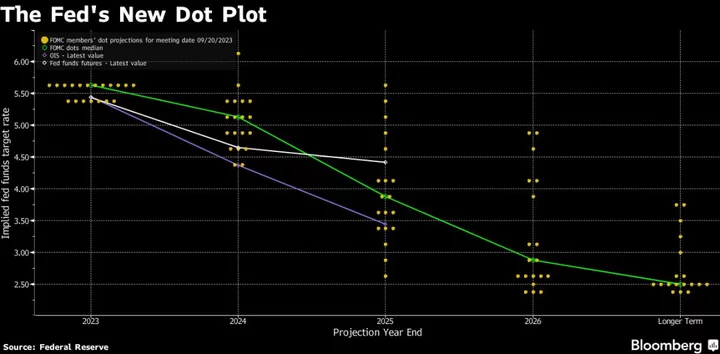
Stocks Retreat as BOE Cliffhanger Follows the Fed: Markets Wrap
Stocks dropped after the Federal Reserve signaled interest rates will be higher for longer and as traders awaited
2023-09-21 16:26
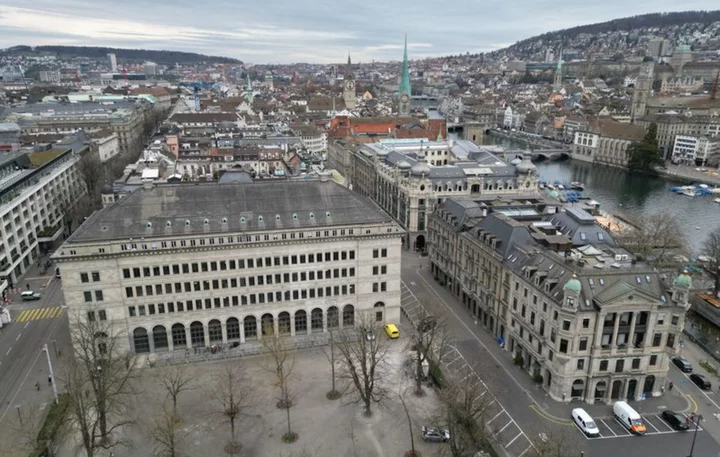
SNB leaves rates unchanged, Sweden and Norway hike again
LONDON (Reuters) -In a big day for central banks across Europe on Thursday, Switzerland shocked markets by leaving its interest
2023-09-21 16:20
